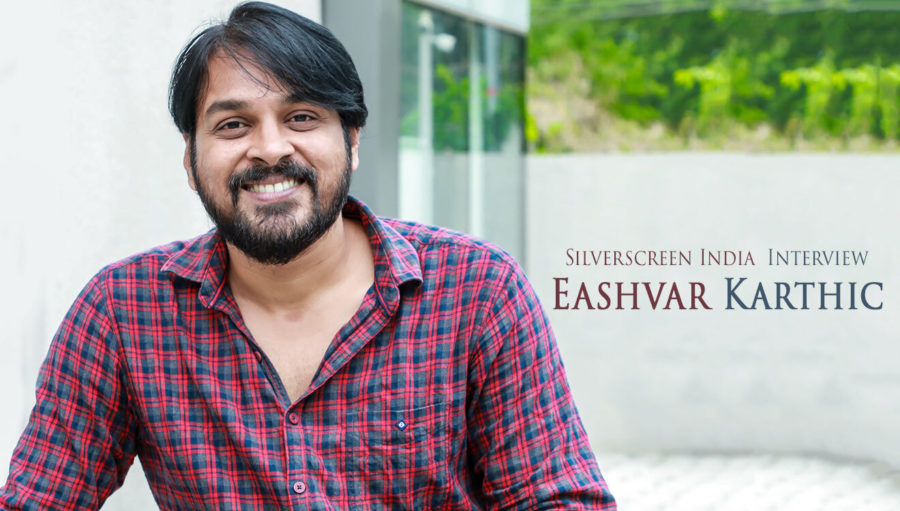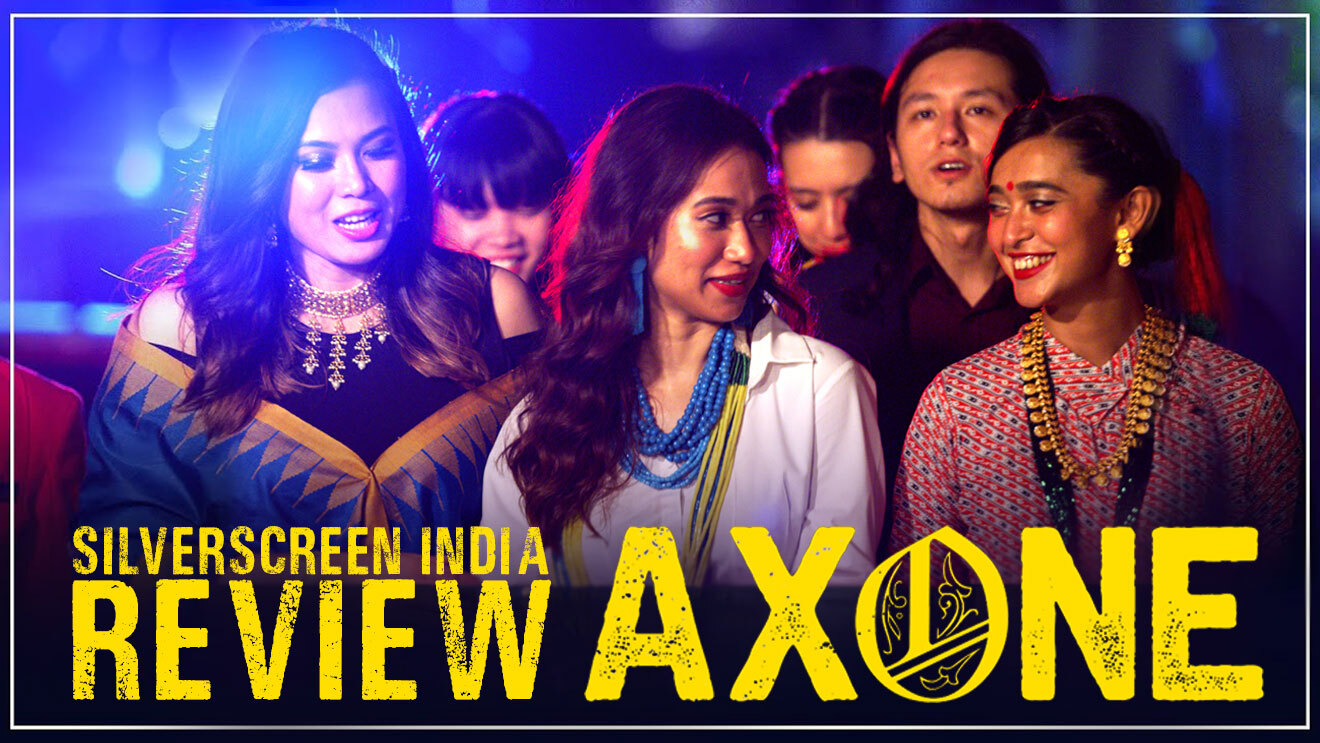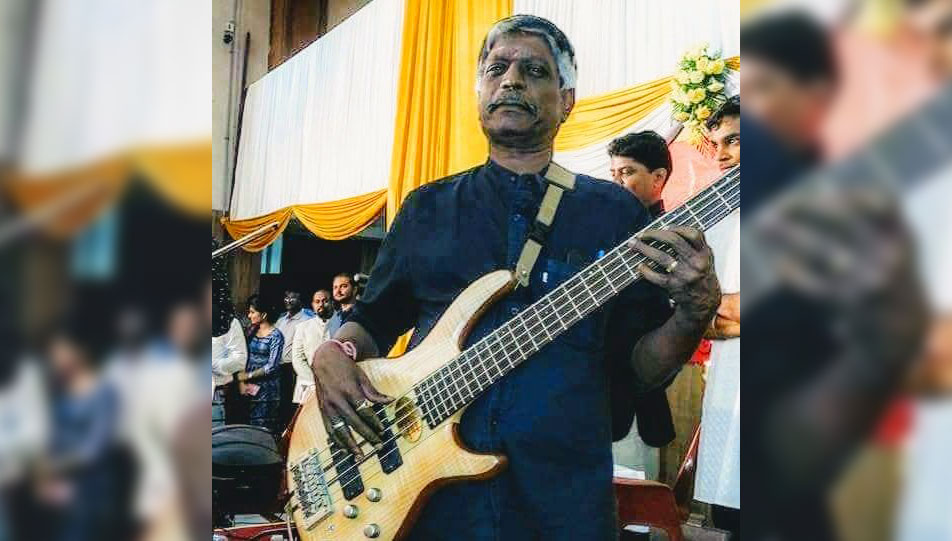We hear people all around us, be it the film industry or just avid moviegoers say that filmmaking and its process these days is easier when compared to the olden, golden period. It was certainly difficult back then, given the limited number of people venturing into such a risky field and taking a gamble. Getting the chance to work behind or in front of the camera was a privilege only very few had. However, it doesn’t mean the artists of today have it easier in comparison.
An example of that is Penguin/PenQueen director Eashvar Karthic who has made his way to the top with nothing but passion for cinema. With no short films to showcase or directors to be referred by, he is now the captain of a ship that’s got top actress and National Award winner Keerthy Suresh on board. His maiden venture is being bankrolled by the most sought-after production banner, Karthik Subbaraj‘s Stone Bench Films.
Silverscreen spoke to director Eashvar Karthic about the OTT premiere, his film and thoughts on motherhood, his favourite directors, and more. Here are a few excerpts from the interview:
In a recent interview, filmmaker Shoojit Sircar said he was relieved that he would not be receiving box office updates every hour for his direct OTT release Gulabo Sitabo. Do you feel the same way or would you have loved that pressure?
(Laughs.) I’m honestly missing those moments to a great extent. It’s my first film and as any other debutant would, I wanted to watch the film on the big screen. I wanted to witness the response to the content and reactions of audiences in many instances. I believed it’ll give my writing some maturity. I wanted to know what works and what doesn’t and to know if I’ve misinterpreted the audience or the content in any way. Now I’m missing all those lessons and it is sort of devastating. I also think it’s because it’s my maiden venture. Maybe if this was my second or third film, I would’ve learnt from my mistakes and my writing would be better to the extent where I needn’t worry much. But I’m definitely missing a huge part of the process. Nevertheless, I’m satisfied that my film is now reaching a pan-Indian and worldwide audience now. Most people have got accustomed to OTT platforms these days due to the lockdown and are almost always glued to it. So when it’s going to release in such a medium, I’m happy that I’ll have more eyeballs and that it won’t get wasted in any way. So you can say I’ve reached a balanced mindset or to put it better, I’ve reached the zen state.
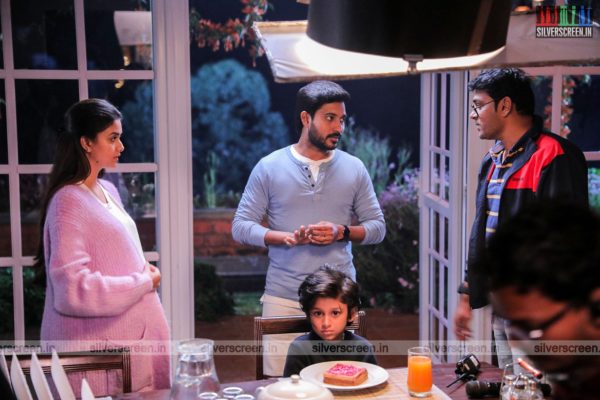
DIN_5138
Filmmaker Karthik Subbaraj’s Stone Bench Creations has commissioned your film. How involved was he in the entire process and the ideas he chipped in being a fan of the thriller genre himself?
Before taking up the mantle of a producer, he’s been a veteran director and a creative head. I was apprehensive of narrating the story to him. Given his stature, I was worried that I would narrate something amateurish and walk back home with a long-face. But contrary to my thoughts, he was amiable and gentle. When I narrated the story, he asked me a few important questions but never interfered in the creative process. He let me act according to my intuition and didn’t chip in ideas either. His questions helped me identify the loopholes in the plot and paved the way for a redraft of the story.
It wasn’t just him, but the entire team of Stone Bench that trusted me and my work. And that creative freedom has helped me immensely to execute my story. Karthik told me that he would be satisfied as long as what I had narrated to him translates exactly on screen. Honestly, I couldn’t give the exact same output because of several issues and the weather conditions in Kodaikkanal but he was happy with the final out when it was screened for him. He told me that the output had matched my narration.
During our shoot, he was busy in London with Jagame Thandhiram and couldn’t visit the sets. Even when the puja for our film was conducted, he wished my team and me through a phone call. I didn’t meet him more than twice nor spoke to him over call ever since the filming of Penguin began. Only once, producer Kaarthekeyan Santhanam visited the set. But even that was only for about thirty minutes. It wasn’t for a discussion or supervision of activities but for a mini tea party that was hosted for the crew. (Laughs.) I think my work has spoken and fetched me this trust. They seem to have received positive feedback from the crew regarding my working style. I’m thankful for this.
When did work on the film begin and why did you choose this to start your film career with? Did you have other scripts in hand before this?
I actually wanted to do a science-fiction action script for my first film and Penguin wasn’t in the picture back then. There isn’t a single actor who hasn’t heard of this script of mine but somehow it failed to materialise. Even producers weren’t willing to take on the script. I climbed several staircases for about two to two-and-a-half years but it all went in vain. I was vexed and had almost given up on the project, not knowing where to go and who to approach. Though it was part of the process, I had lost two years of my life and did not want to continue this way. I decided to give myself a period of three months and if nothing favours me, I decided to drop the idea of direction altogether. I had to look out for ways to survive instead of pinning hopes on something that wasn’t likely.
As a last shot, I took this script of mine, the line of which I had cracked a while ago and approached Stone Bench’s Kaarthekeyan with the help of actor Vijay Sethupathi. We had Keerthy and two other heroines in mind for essaying the lead role. If Keerthy hadn’t agreed, we would have gone ahead with either of the other two. But she loved the story and immediately agreed. I must say it magically worked out and has now reached this spot.
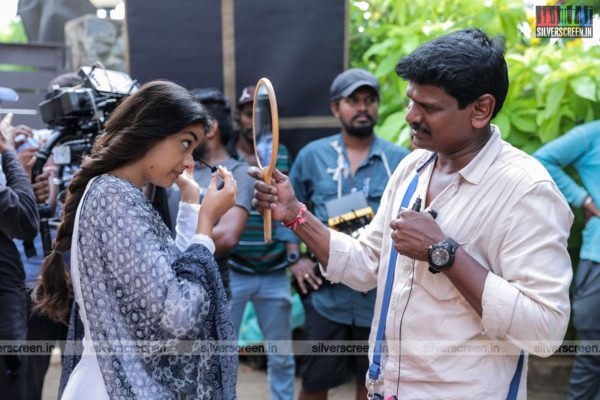
DIN_5177
Are you concerned about the expectations on you, given that Penguin is the first solo release for Keerthy Suresh post the mammoth Telugu blockbuster Mahanati?
It was very high in the beginning until I narrated the story to her. I kept wondering how she’d receive it. But that’s where my two years of relentless narration to several actors came into play. It made the process easy for me. I was only worried about whether she’d accept the pregnant role and not for the story narration part. But everything went on smoothly, thanks to her. She gave me that comfort right from the beginning, be it the way she received me at her place or even the way she was involved in the script. She never treated me like a debutant and always respected me. It made it easy for me to communicate and extract what I wanted.
We shared great rapport during rehearsals and the several script reading sessions. I understood that she could grasp my ideas instantly and work on it just as I wanted. But honestly, it was only on set that I realised she’s a director’s artist. I did not take into mind her stature or the laurels she has to her name and looked at her only as Rhythm, the character that she has essayed. It was mutual right through the 35-day shoot.
When it comes to audiences and their liking, nothing solid can be made out. It’s like a voting poll. We’ve done our part and handed over the project to them and it is left to them now to decide if it’s worthy or not. It definitely has its share of strengths and flaws. I’m not saying it’s one of the best projects ever made. Irrespective of the result, I will look at it as a big lesson for me for my future projects.
What was the inspiration for the most-talked-about Charlie Chaplin-sque character? You had mentioned that costume designer Pallavi Singh was also behind the creation of the character. Tell us a little about it…
The mask accessory was actually not a part of the original plan. I only had the yellow umbrella man character sketched in my mind. I knew he would threaten the village from dawn to dusk but nothing apart from that. When we started with work on set, I realised that the umbrella didn’t cover his face defeating the whole purpose of the character. We mulled over the different things we could do to cover his face. I spoke to Pallavi for ideas and she came up with something resembling a shawl but it didn’t manage to convince me.
We got an outfit specially designed for the character which cost almost 1.5 – 2 lakh rupees given the several layers and material used. I owe it to Pallavi for the amount of effort she put into the making of that costume. It had a hood attached to it, but that didn’t convince me either. About five days before we commenced with the shoot, I decided we’d go for a mask. But masks have been overused not only in Hollywood but even in our Indian film industry. So I wanted to opt for something unique and quite novel and that’s when Hitler’s face popped up in my head. I realised Hitler had zilch relevance to the story, so I decided to construct a mask with Charlie Chaplin’s face because of their resembling persona. It also had relevance to the character who lures young children in the village.
I didn’t realise it would connect with the audiences so well. It was an idea that popped up out of nowhere and it seems to have helped us out pretty well.
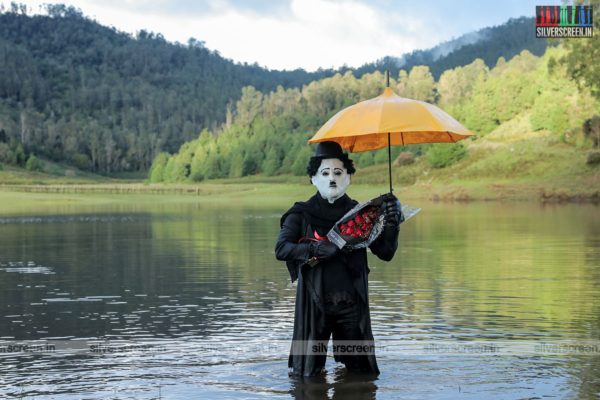
DIN_1756
On women actors headlining thriller films more these days…
I feel the story would play out well only if women essayed those roles be it Pink, Thappad, Maya, Kolamaavu Kokila, Ponmagal Vandhal, and even Penguin. Only women actors are capable of justifying those roles and adding value to the film. While the Hollywood industry churns out a lot of women-centric stories, the Indian industry is only beginning to accommodate such films.
To be honest, when a woman is left to deal with threats and difficult situations, it connects better with audiences. I think writers feel they can weave in more conflict when the protagonist is a woman. You can also look at it as an easy way out, to be frank. The sad truth is that gender-biased scripts are still prevalent. For example, I could’ve written the story of Penguin with a man and his son and the story would’ve still held good. But it would take the usual course of a police investigation and not provide anything fresh or special. Taking the story from the perspective of a mother has made it better and interesting. I did not plan and write this. I just felt it would be more impactful.
If we’re talking about experimenting with other genres, it depends on how the character is designed. The only rule is that it should be plausible. If it is, then any screenplay can be written is what I truly believe. In Penguin, I’ve pitted a housewife against a monster which is somewhat new, according to me. But Rhythm still remains true to her character. She will act only within her capabilities and not perform larger than life stunts. In Tomb Raider, Lora Croft (Alicia Vikander) is an adventurer, so we’d accept the stunts performed by her. To put it in simple terms, any story would sell if characters are written in accordance with its plot.
After Jyotika starrer Ponmagal Vandhal hit the OTT platform last month, a lot of talk has been there about colour grading and audio levels for OTT. With Penguin hitting OTT, most of the viewers are bound to witness the film on smaller devices with ear gear plugged in. Taking this into consideration, how much of the colour tone and sound design has been tweaked for the release? Tell us about the work of Karthik Palani and Thomas Kurian.
This is an important consideration we had to look into. We were all prepared for a theatrical release and got the frames colour graded and sound designed accordingly. But fortunately and unfortunately, we were informed one month prior to the release that we’d be hitting the OTT platform directly. This brought in more post-production work and we had to regrade the film and design sound once again to match the international standards laid down by Amazon Prime Video. Karthik Palani tweaked the colours and adjusted the gama levels accordingly.
With respect to sound design, Thomas Kurian and Santhosh Narayanan jointly discussed and worked on it to dish out a different and special output. We were aware that 95% of the people would watch with earphones, 3% on TV, and only a meagre 2% with 5.1 surround sound system. So we split the audio tweaking process into segments and worked on it to make sure the dialogues, background score, and sound effects reach all audiences perfectly.
Working with Santhosh Narayanan..
Since I’m a newcomer in the industry, I didn’t know how I’d be treated given the people I’m working with. I may know my craft, but they’re experts in their respective fields. Sana was a warm person and made me comfortable instantly. His tunes have always been different and I knew he’d elevate the film to another level with his music. I could say, the trailer was just a sample of his wonderful work. He’s worked on a unique soundscape during many significant instances in the film increasing the intensity of those portions. I’m blessed to have him in my film.
While the teaser and trailer have already led to several comparisons with local and foreign language films owing to the genre, are you ready for all that talk after the film?
(Laughs.) I’m happy that my film is being compared to the many wonderful films across the world. But jokes apart, I can assure that Penguin is a one-of-a-kind film. Whatever we showcased through the trailer is not what the film is actually about. We’ve also been reading and watching the trailer reactions and decoding videos that have been pouring in and it is all that we had expected. There are many surprises in the film which we believe would work. But again, let’s wait and watch.
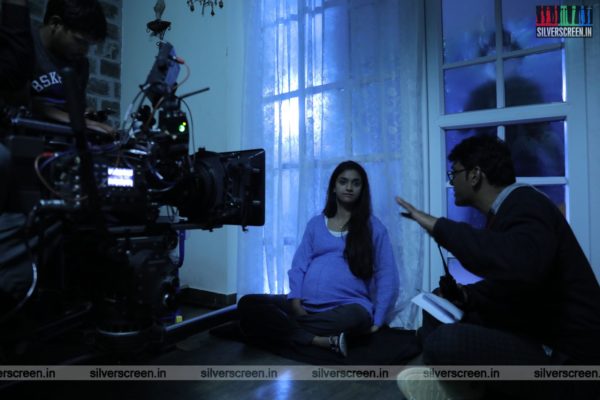
DIN_6506
Is the film a reflection of your thoughts on motherhood?
I love my mom and obviously everybody around the world does. There’s this line which I keep enunciating when I talk about mothers and their love, “If your mother isn’t able to recognise something about you, nobody in this world would be able to either.” I strongly believe this. And to top it, my wife was pregnant when I was penning the story of Penguin. She was my inspiration for Keerthy’s character.
You had a substantial role to essay in the recent crime-investigation film V1 Murder Case. How did that stint help you in the process of your film?
The entire team of V1 Murder Case is close to me. I have been with the team right from the nascent stages and took up the role I essayed as a friendly gesture. Pavel, the director of V1, had his own style of filmmaking and was clear about his ways. Just like him, I wanted to have my own style when I made a movie. It did not influence my work, but I was constantly learning a thing or two from the way they worked.
A few years back, I worked on a one-hour telefilm named Iyakkunan and that’s where I befriended actor Linga who plays an important role in my film. I also met my editor Anil Krish in the same telefilm. I could say about 25% of my friends who I met during the telefilm project have worked on my film Penguin. It’s almost a four-year journey and the understanding between us has always been wonderful.
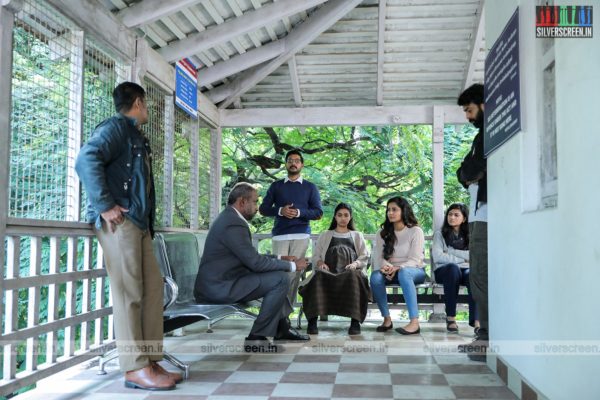
DIN_7401
Tell us about the other important roles apart from Keerthy.
Talking about known faces, we’ve got actor Linga, and Madhampatty Rangaraj in important roles. Apart from that, I have roped in Madhiazhagan who hails from Singapore along with newcomers Nithya and Harini. They’re all theatre artists and I felt the need to bring them to the silver screen.
Even if they appear in just one scene, they’d have a great impact and would push the story forward. That is how I’ve built their roles. I find screenplay writing for a thriller more exciting when we’ve got fewer characters to deal with and I’ve always wanted to write that way. Singling out the perpetrator from a flock of 25 is always easier when compared to a small bunch of five at least for me. So I can’t and don’t want to reveal much now. You will get to know more once you’ve seen the film.
You haven’t taken the beaten path of working under a director or directing short films to step into the industry. Do you look at it as a disadvantage or do you feel there was no necessity for the same?
Frankly speaking, I didn’t get the chance to work under anyone and my direction stint was actually an accident. I came into the film industry to act, but I didn’t get enough chances and the recognition I wanted. So I took to writing scripts and approached producers requesting them to only cast me in the film and give the mantle of director to anybody who wanted to direct. But there again, I was rejected.
Recommended
So I decided to take to direction and learn the craft of filmmaking. I’ve always had passionate film people around me who discuss healthy cinema and its impact. So I’ve always had the notion that my style shouldn’t be influenced by anyone around me and should be one of my own. This is what I also tell the people around me. It definitely isn’t wrong to get inspired. My film Penguin is also a work of art that I created out of sheer inspiration. But one must never get influenced by another person’s work of art.
I don’t know if not working under a director is a disadvantage because the film has already happened to me. But from the reviews and feedback I receive from audiences, I would be able to get a clear picture. I’m open to everything that’s going to come my way and I’m always looking out for ways to improve myself.
What kind of movies do you enjoy?
I stan Jackie Chan more than anybody else. So naturally, I love action films. I also have an inclination towards adventure films and films with a strong emotional core. I always connect well with those films.
I have a lot of favourites when it comes to directors but I’d like to pick out names from the Indian film industry. I enjoy the works of directors like Fazil and Mani Ratnam. Recently, a lot of contemporary filmmakers have left me awestruck with their films.
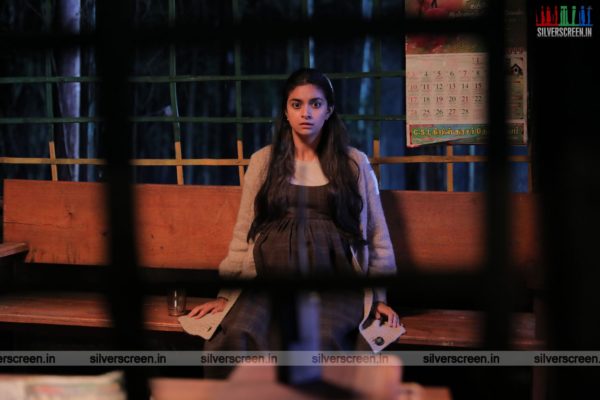
DIN_2808
Penguin that was to hit the screens in early 2020 is now streaming on Amazon Prime Video directly. It is streaming in Tamil and Telugu on the platform along with a dubbed Malayalam version.
Watch the trailer of Penguin/PenQueen here:
